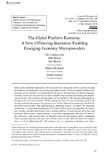| dc.contributor.author | Lehdonvirta, Vili | |
| dc.contributor.author | Kässi, Otto | |
| dc.contributor.author | Hjorth, Isis | |
| dc.contributor.author | Barnard, Helena | |
| dc.contributor.author | Graham, Mark | |
| dc.date.accessioned | 2021-02-24T11:55:44Z | |
| dc.date.available | 2021-02-24T11:55:44Z | |
| dc.date.issued | 2019 | |
| dc.identifier.citation | Lehdonvirta V, Kässi O, Hjorth I, Barnard H, Graham M. The Global Platform Economy: A New Offshoring Institution Enabling Emerging-Economy Microproviders. Journal of Management. 2019;45(2):567-599. doi:10.1177/0149206318786781 | |
| dc.identifier.uri | https://opendocs.ids.ac.uk/opendocs/handle/20.500.12413/16359 | |
| dc.description.abstract | Global online platforms match firms with service providers around the world, in services ranging from software development to copywriting and graphic design. Unlike in traditional offshore outsourcing, service providers are predominantly one-person microproviders located in emerging-economy countries not necessarily associated with offshoring and often disadvantaged by negative country images. How do these microproviders survive and thrive? We theorize global platforms through transaction cost economics (TCE), arguing that they are a new technology-enabled offshoring institution that emerges in response to cross-border information asymmetries that hitherto prevented microproviders from participating in offshoring markets. To explain how platforms achieve this, we adapt signaling theory to a TCE-based model and test our hypotheses by analyzing 6 months of transaction records from a leading platform. To help interpret the results and generalize them beyond a single platform, we introduce supplementary data from 107 face-to-face interviews with microproviders in Southeast Asia and Sub-Saharan Africa. Individuals choose microprovidership when it provides a better return on their skills and labor than employment at a local (offshoring) firm. The platform acts as a signaling environment that allows microproviders to inform foreign clients of their quality, with platform-generated signals being the most informative signaling type. Platform signaling disproportionately benefits emerging-economy providers, allowing them to partly overcome the effects of negative country images and thus diminishing the importance of home country institutions. Global platforms in other factor and product markets likely promote cross-border microbusiness through similar mechanisms. | |
| dc.publisher | SAGE | |
| dc.rights.uri | http://creativecommons.org/licenses/by/4.0/ | |
| dc.title | The Global Platform Economy: A New Offshoring Institution Enabling Emerging-Economy Microproviders | |
| dc.type | Article | |
| dc.rights.holder | © The Author(s) 2018 | |
| dc.identifier.externaluri | https://doi.org/10.1177%2F0149206318786781 | |
| dc.identifier.ag | ES/I033777/1 | |
| dc.identifier.doi | 10.1177/0149206318786781 | |


